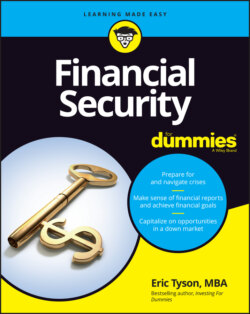Читать книгу Financial Security For Dummies - Eric Tyson - Страница 12
Trying not to avoid money
ОглавлениеOne big obstacle is that just about everybody avoids dealing with some aspect of money. For some, it’s as simple as avoiding looking regularly at their checking account and verifying transactions and the account balance or making decisions about where to invest saved money. Others neglect needed insurance coverage, perhaps out of fear of confronting their own mortality and vulnerabilities. Some people are plagued by broader problems such as feelings of guilt and shame about money or feeling that money seems dirty and evil.
The fact that money-related issues aren’t always at the top of your priority list may well be a good sign. Perhaps you spent the past weekend with friends and family or were engrossed in a captivating book or newly discovered streaming series. But continually avoiding money or some aspect of your finances can result in unnecessary long-term pain.
Some personal finance procrastinators can get away with their ways for a number of years. However, whether it’s in the short term or the long term, eventually, problems do occur from avoiding dealing with money and related decisions, and sometimes the damage can be catastrophic.
Some money avoiders don’t plan ahead and save toward future goals. Often, the reality hits home when they contact the Social Security Administration (SSA) or get an update from the SSA and discover what monthly retirement benefit amount they’ll get at full retirement age (which is around age 66 to 67 for most people). The reality for many people means the realization that they’ll have to continue working into their seventies in order to maintain the modest standard of living to which they’ve become accustomed.
Several issues typically cause a lack of retirement funds. Many money avoiders could save more money, but they typically aren’t motivated and organized enough to do so. Generally, they haven’t bothered to conduct even basic retirement analysis to understand how much they should be saving to reach their retirement goal (or even think about if and when they want to retire).
Because money avoiders dislike dealing with money, what they’re able to save often gets ignored and languishes in low- or no-interest bank accounts. Avoiders also tend to fall prey to the worst salespeople, who push them into mediocre or poor investments with high fees. When avoiders choose their own investments, they often do so based on superficial research and analysis, which can lead to piling money into frothy investments when they’re popular. Discomfort causes avoiders to bail out when things look bleak.
Money avoiders, more often than not, lack wills and other legal documents that should specify to whom various assets shall pass and who is responsible for what (for example, administering the estate and raising minor children) in the event of their untimely demise. When money is to pass to heirs through an estate, the absence of documents can lead to major legal and family battles.
